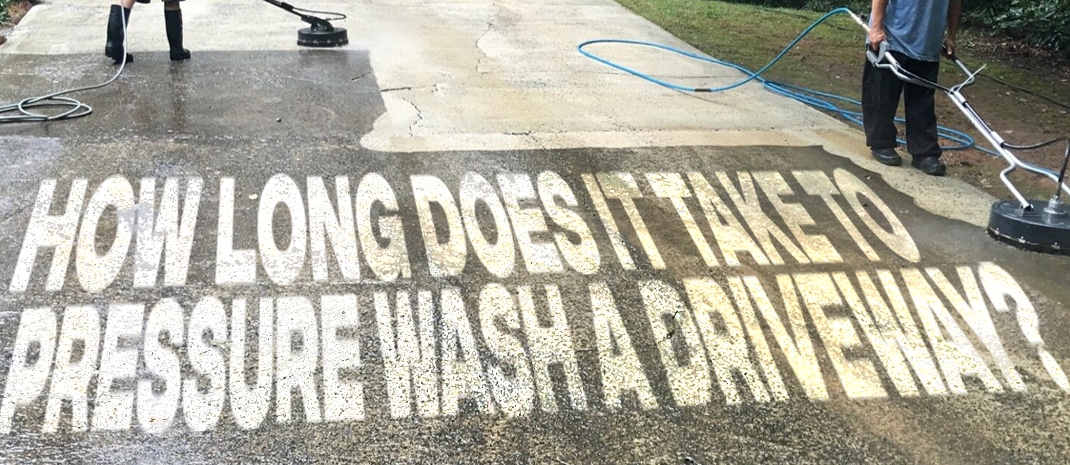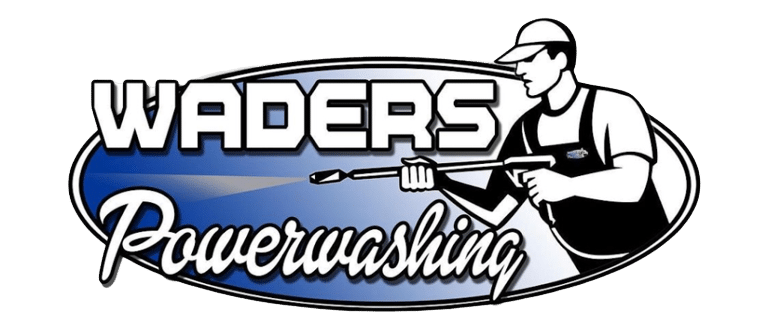How Long Does It Take to Pressure Wash a Driveway?

The sight of a freshly power-washed driveway is a feeling of satisfaction. Grime, dirt, and stains vanish, replaced by a clean surface that instantly boosts curb appeal.
But before you fire up the pressure washer and unleash a torrent of cleaning power, a crucial question lingers: How Long Does it Really Take to Power Wash a Driveway?
The truth is, there’s no one-size-fits-all answer to the power washing time riddle. Several factors conspire to influence the duration of your driveway’s transformation.
Let’s delve into these factors and equip you with the knowledge to estimate your own power washing project timeline.
Size Matters: The Square Footage Showdown
The most significant factor is, unsurprisingly, the size of your driveway. A compact, single-car driveway will take considerably less time to tackle than a sprawling, multi-vehicle monstrosity.
As a general rule, expect to spend:
- 30 minutes to 1 hour for a standard, single-car driveway.
- 1-2 hours for a typical double-car driveway.
- 2+ hours for larger, more intricate driveways with curves, multiple sections, or decorative features.
Surface Showdown: Concrete vs. Asphalt vs. Pavers
The material your driveway is constructed from also plays a role. Here’s a breakdown of how each surface type might influence cleaning time:
- Concrete: The most common driveway material. It’s generally forgiving and allows for higher pressure settings, potentially speeding up cleaning.
- Asphalt: A more delicate surface. Lower pressure settings are necessary to avoid damage, which can extend cleaning time.
- Pavers: These intricate surfaces require meticulous cleaning between each paver, increasing the time commitment.
The Stain Struggle: From Light Dust to Deep Grime
The severity of the stains on your driveway significantly impacts cleaning time. Here’s a spectrum to consider:
- Light dirt and dust: A quick wash with minimal effort, potentially taking as little as 20 minutes.
- Stubborn grime and tire marks: Requires more scrubbing and concentrated cleaning, adding 30 minutes to an hour.
- Oil stains and heavy mold: These stubborn foes demand pre-treatment, multiple cleaning passes, and possibly specialized cleaning solutions, extending the project to several hours.
The Power of the Pressure Washer: GPM and PSI
The pressure washer itself is a factor. Here’s what to consider:
- Gallons Per Minute (GPM): This indicates the water flow rate. Higher GPM translates to faster cleaning, especially for larger driveways.
- Pounds per Square Inch (PSI): This reflects water pressure. While higher PSI might seem ideal, using excessive pressure can damage surfaces. Choose the appropriate pressure based on your driveway material and the severity of the stains.
The Human Factor: Your Power Washing Prowess
Experience matters. A seasoned power washing pro will likely work faster and more efficiently than a first-timer.
If you’re tackling multiple exterior cleaning tasks, such as your driveway and fences, consider the value of hiring specialized services.
You can also hire a Fence Cleaning Company to ensure the exterior of your home is pristine. Don’t get discouraged if your initial cleaning takes longer—practice makes perfect (and saves time!).
Beyond the Basics: Time-Consuming Considerations
There are additional factors that can add to your power washing project duration:
- Prep work: Moving furniture or potted plants out of the way can add 15-30 minutes.
- Safety measures: Setting up tarps and protecting landscaping might take another 15-20 minutes.
- Taking breaks: Factor in short breaks to avoid fatigue, especially for larger projects.
Making the Most of Your Time: Power Washing Efficiency Tips
Here are some ways to streamline your power washing process:
- Work in sections: Tackle your driveway in manageable sections to avoid missing spots and ensure even cleaning.
- Use a surface cleaner attachment: This attachment is a game-changer for large, flat surfaces like concrete driveways, significantly reducing cleaning time.
- Pre-treat tough stains: Apply a degreaser to oil stains or a specialized cleaner for mold and mildew before power washing. This loosens grime and reduces the cleaning passes needed.
- Work with a partner: Having a helper to handle tasks like moving furniture or collecting runoff water can significantly improve efficiency.
The Final Rinse: Estimating Your Power Washing Timeframe
Now that you’re armed with knowledge, here’s how to estimate your power washing timeframe:
- Measure your driveway’s square footage.
- Consider your driveway’s surface material and the severity of the stains.
- Factor in your experience level and the additional considerations mentioned above.
Combining these elements allows you to create a realistic time estimate for your power washing project. Remember, this is just an estimate – unexpected challenges may arise.
Tip: You might also need a Deck Cleaner in NJ for your outdoor living spaces after cleaning your driveway.
The Power-Washing Pro Option: When to Hire a Professional
While the satisfaction of a DIY power washing project is undeniable, there are situations where hiring a professional might be the better option. Here are some signs to watch for:
- Large or complex driveways: Tackling driveways with intricate designs or multiple sections can be incredibly time-consuming. Professional services might be more efficient for extensive driveways or Parking Lot Cleaning.
- Stubborn stains: If your driveway is plagued by oil stains, heavy mold, or other deeply embedded grime, a professional cleaner might have access to specialized solutions and techniques that can achieve superior results
- Safety concerns: Pressure washers can be powerful tools, and improper use can cause injury or damage to property. If you’re uncomfortable wielding the pressure washer yourself, hiring a pro ensures the job is done effectively and safely.
- Time constraints: If your schedule is jam-packed, hiring a professional allows you to reclaim valuable time and have the job done quickly and efficiently.
Tip: Professionals from a Power Washing Company in New Jersey have the experience and equipment to handle these projects efficiently.
The Cost vs. Time Trade-Off: How Much Does Professional Power Washing Cost?
The cost of professional power washing varies depending on your location, driveway size, and service level required. Generally, expect to pay anywhere from $100 to $300 for a standard driveway cleaning to Commercial Pressure Washing.
While this might seem higher than the cost of renting a power washer yourself, it’s important to factor in the time saved, the expertise of the professional, and the peace of mind that comes with knowing the job is done right.
Understanding the Cost and Time of Professional Power Washing
Power washing your driveway is an investment in your home’s curb appeal and longevity, and Residential Pressure Washing is a great DIY project for homeowners.
By understanding the factors that influence cleaning time, you can create a realistic timeline for your project or decide if hiring a professional is the best course of action.
Whether you tackle the task yourself or enlist the help of a pro, the end result—a sparkling clean driveway—will be well worth the time investment.
So, grab your pressure washer (or phone a professional!), and get ready to transform your driveway from drab to fab!
Bonus Tip: After power washing your driveway, consider applying a sealant to protect it from future stains and extend its lifespan.
FAQs
Q1: I’m power washing my driveway; how long will it take?
A1: The time can vary depending on a few factors. A standard driveway can take anywhere from 30 minutes to a couple of hours. Here’s what affects the duration:
Size: Bigger driveways naturally take longer.
Stains: Heavy grime or oil stains require pre-treatment and more cleaning passes, extending the time.
Pressure washer: A powerful washer with a high GPM (gallons per minute) cleans faster.
Q2: Does the size of my driveway affect how long it takes to pressure wash?
A2: Absolutely! Cleaning a small, single-car driveway will be quicker than cleaning a sprawling multi-car one. Consider the amount of surface area that needs cleaning—the bigger the space, the more time it takes.
Q3: Are there ways to speed up the power washing process?
A3: Yes! Here are some tricks to make your cleaning session more efficient:
Work in sections: Divide your driveway into manageable areas to ensure even cleaning and avoid missing spots.
Surface cleaner attachment: This game-changer for large, flat concrete driveways. It significantly reduces cleaning time by covering a wider area.
Pre-treat tough stains: Apply a degreaser or specialized cleaner for mold before power washing. Loosening the grime upfront minimizes the cleaning passes needed later.
Work with a partner: Having a helper can significantly improve efficiency. They can handle tasks like moving furniture or collecting runoff water while you focus on cleaning.
